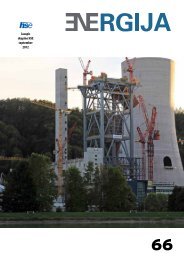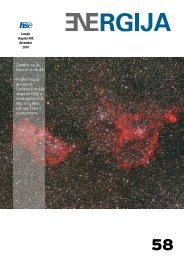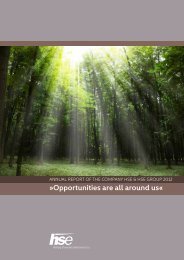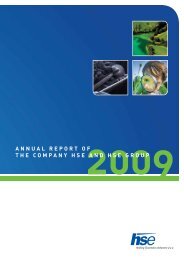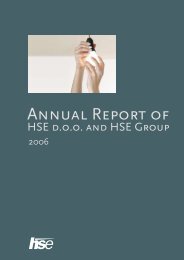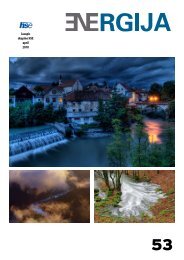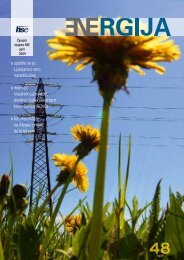ANNUAL REPORT - HSE
ANNUAL REPORT - HSE
ANNUAL REPORT - HSE
You also want an ePaper? Increase the reach of your titles
YUMPU automatically turns print PDFs into web optimized ePapers that Google loves.
<strong>ANNUAL</strong> <strong>REPORT</strong> <strong>HSE</strong> | BUSINESS <strong>REPORT</strong><br />
52<br />
Continental Europe<br />
Characteristic of the year 2008 were extremely quickly<br />
growing prices of oil and other energy products in the<br />
first half of the year. The price of oil in July reached<br />
$145 per barrel. Consequently, the prices of electricity<br />
and CO 2<br />
coupons followed the upward trend.<br />
In 2008 the transmission capacities between Slovenia<br />
and Italy were leased at extremely favourable<br />
conditions at the annual level. During the year, <strong>HSE</strong><br />
also successfully participated in monthly auctions to<br />
secure transmission paths from the same direction,<br />
but was less successful in acquiring transmission capacities<br />
at other Italian borders, as the prices were<br />
extremely high. In December, trading on the French-<br />
Italian border opened.<br />
In 2008 a significant novelty in Continental Europe was<br />
the foundation of a branch office in Slovakia. The main<br />
purpose of this foundation was to fill the gap between<br />
the Czech Republic and Hungary, thus enabling energy<br />
flow from the Czech Republic, which will remain a net<br />
exporter of electricity for a number of years, through<br />
Slovakia and Hungary to SE Europe, which is already a<br />
net importer of electricity.<br />
Towards the end of 2008 it turned out that the decision<br />
to establish the <strong>HSE</strong> Bratislava Branch Office was the<br />
right one, as <strong>HSE</strong> exploited a number of trading opportunities.<br />
In 2008 trading on the Czech market was more moderate<br />
on account of an unfavourable relationship<br />
between the Czech and German electricity prices.<br />
In February, the company became a member of the<br />
Prague power exchange PXE, thus gaining mainly the<br />
possibility to purchase and sell electricity for a longer<br />
period. The downside of the said exchange is the still<br />
relatively poor liquidity. However, the power exchange<br />
provided for the possibility of trading in the Slovakian<br />
market, which will become interesting once Slovakia<br />
cancels the export fee hindering a greater expansion<br />
of trading on this market.<br />
SE Europe<br />
In the past year both the prices of short-term and longterm<br />
electricity supply grew in SE Europe. Coinciding<br />
with the closure of two reactors at a Bulgarian nuclear<br />
plant at the end of 2006, Bulgaria cut electricity exports<br />
and in early 2008 prohibited the export of electricity to<br />
the region, despite sufficient surplus production capacities,<br />
in order to maintain low prices in the domestic<br />
market. The ban on export lasted for two months, but<br />
introduced uncertainty about the source of cheap energy<br />
from Bulgaria, which was reflected in a rapid price<br />
increase of supply in other countries of the region.<br />
In the past year <strong>HSE</strong> took part in auctions for crossborder<br />
transmission capacities in most SE European<br />
countries, which contributed to greater trading volume<br />
in those markets. The exception was Bosnia and<br />
Herzegovina, where a registered licensed company is<br />
now required for participation in auctions. This condition<br />
did not exist before. Trading in SE Europe in 2008<br />
was influenced by the events in the Hungarian market.<br />
Trading in this market became more transparent and<br />
liquidity is rising, also due to the providers of trading<br />
via portals. The Hungarian market was still very important<br />
for <strong>HSE</strong>, however, trading volumes were below<br />
last year's level as a result of the inability to create a<br />
long-term electricity portfolio, restrictions on the sale<br />
of electricity placed by the Hungarian Energy Agency<br />
(MVM), and the introduction of an export fee in the<br />
amount of approximately €17/MWh.<br />
The rise in trading volumes in this area at the start of<br />
2008 was still impeded by various costs and restrictions<br />
of electricity transit, which were, contrary to the<br />
European practice, imposed by transmission network<br />
system operators on electricity traders. In mid 2007,<br />
most SE European countries signed the ITC mechanism,<br />
which abolished the majority of transit duties.<br />
Certain countries have maintained some of the duties,<br />
but have done so under different names and to<br />
a smaller extent. The trend to close the markets and<br />
restrict trading by means of duties and other instruments<br />
escalated further in the second half of 2008.<br />
Owing to high economic growth in the region, far higher<br />
than in western Europe, consumption also grew faster<br />
in this area. The relatively old and poorly maintained<br />
production facilities, in which hydro production accounts<br />
for a large share, heighten the volatility of supply<br />
prices in this area. Accompanied by poor hydrology,<br />
the prices of long-term contracts in the SE markets<br />
last year substantially exceeded those in Continental<br />
Europe and in the Italian market in spite of the fact that<br />
some producers in this part of Europe are not involved<br />
in the CO 2<br />
trading scheme (only producers with their<br />
own production units in EU member states participate<br />
in the scheme).




